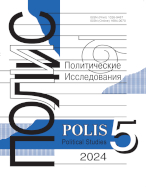Democracy’s organic preferences
Zubov A.B.,
Dr. Sci. (Hist.), Prof., anzubov@orc.ru
Zubov A.B. Democracy’s organic preferences. – Polis. Political Studies. 2013. No. 2
Concepts of democracy are reinterpreted by the author within the frameworks of the theological and of the organic paradigms. He has recourse to vast historical and sociological argumentation to substantiate the conclusion that democracy (civil self-government) on the local level is the natural condition of social organization, which provides efficient economic and cultural development of community. While considering modern Russia’s prospects, the author asserts that the new generation, as more disposed to responsibility, will pave the way for the country to civil self-government and political democracy.
See also:
Offerdal A.,
On Nordic Local Government - Development and Prospects. – Polis. Political Studies. 1999. No2
Rozov N.S.,
Neopatrimonial Regimes: Diversity, Dynamics, and Prospects for Democratization. – Polis. Political Studies. 2016. No1
Glebov V.A., Makuhin A. V. ,
Role of the Local Government in the Formation of Civil Society in Poland. – Polis. Political Studies. 2015. No4
Oganisyan Yu.S.,
Socialism as the first stage of capitalism. Post-soviet Russia’s experience. – Polis. Political Studies. 2013. No3
Inozemtzev V.L.,
«Preventive democracy»: concept. prerequisites of emergence. prospects for Russia. – Polis. Political Studies. 2012. No6





.jpg)






 print
print
.jpg)
.jpg)